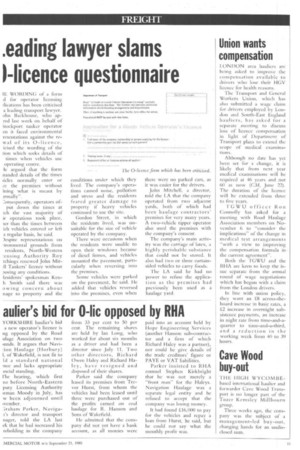.eading lawyer slams Ilicence questionnaire
Page 13

If you've noticed an error in this article please click here to report it so we can fix it.
IE WORDING of a form d for operator licensing qications has been criticised a leading transport lawyer. ohn Backhouse, who apred last week on behalf of 3tockport tanker operator en it faced environmental resentations against the rewal of its 0-licence, icised the wording of the don Which seeks details of times when vehicles use operating centre.
-le argued that the form nanded details of the times licks normally enter or .re. the premises without ining what is meant by irrnally".
consequently, operators ofput down the times at ich the vast majority of it operations took place, -ler than the times between ich vehicles entered or left a regular basis, he said.
)espite representations on ,ironmental grounds from residents, North-Western :ensing, Authority Roy tchings renewed John Mit41 Tankers' licence without Dosing any conditions.
Zesidents spokesman Kenh Smith said there was owing concern about nage to property and the conditions under which they lived. The company's operations caused noise, pollution and stress and the residents feared greater damage to property if heavy vehicles continued to use the site.
Gordon Street, in which the residents lived, was unsuitable for the size of vehicle operated by the company. There were occasions when the residents were unable to open their windows because of diesel fumes, and vehicles mounted the pavement, particularly when reversing into the premises.
Some vehicles were parked on the pavement, he said. He added that vehicles reversed into the premises, even when there were no parked cars, as it was easier for the drivers.
John Mitchell, a director, told the LA that the company operated front two adjacent yards, both of which had been haulage contractors' premises for very many years. A two-vehicle 'tipper operator also used the premises with the company's consent.
The company's main activity was the carriage of latex, a highly perishable substance that could not be stored. It also had two or three curtainsided vehicles to carry foods.
The LA said lie had no power to refuse the application as the premises had previously been used as a haulage yard.




































































































